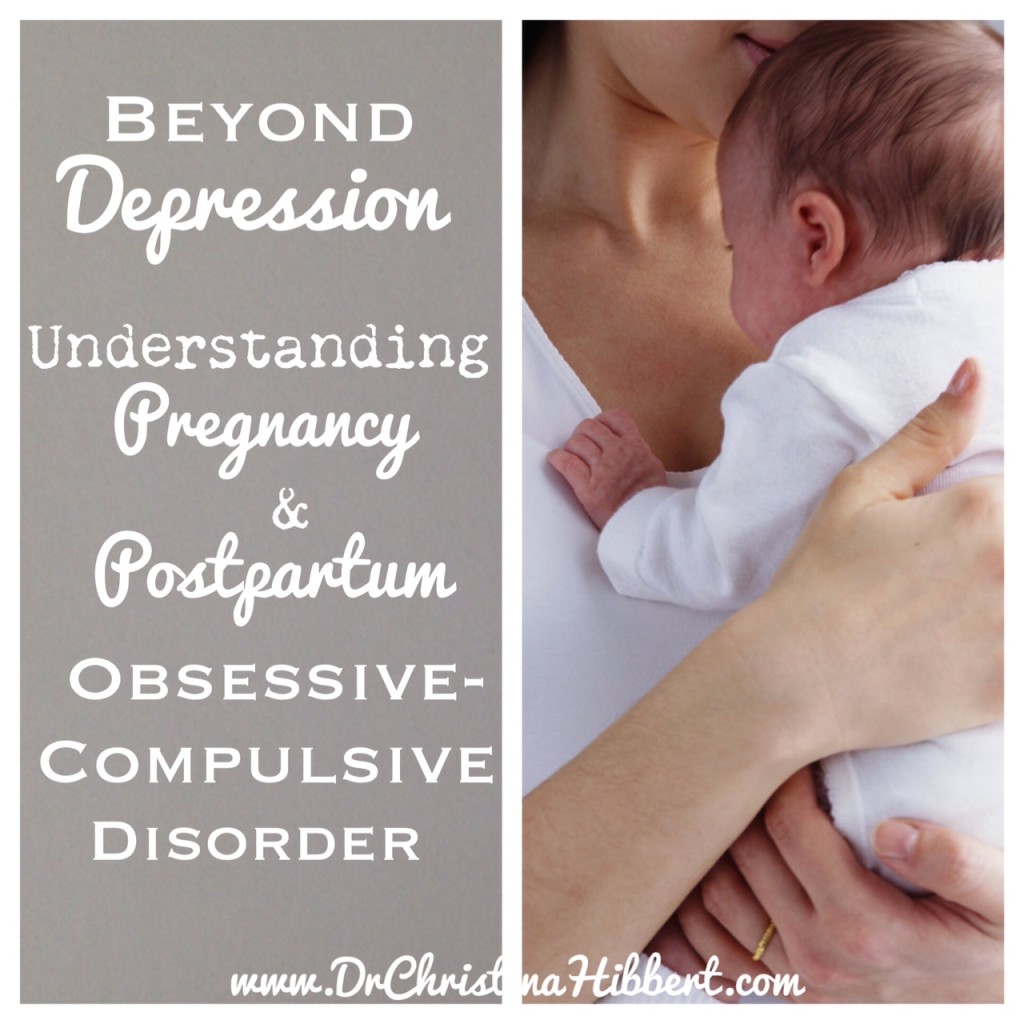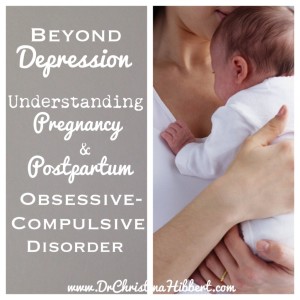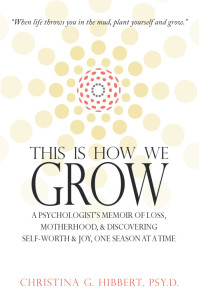
08 Mar Beyond Depression: Understanding Pregnancy & Postpartum OCD–Part 1
 Beyond Postpartum Depression (PPD)
Beyond Postpartum Depression (PPD)
Postpartum Depression (PPD) is the most commonly talked about and treated form of Perinatal Mood/Anxiety Disorder (PMAD). It affects as many as one in five new mothers (up to 20%), and can have a significant impact on the father, the infant, and the entire family.
Yet there is much to learn about Perinatal Mood/Anxiety Disorders beyond PPD. In fact, there’s a spectrum of disorders— ranging from the mild to the severe and including depression, various anxiety disorders, and yes, even psychosis.
The most misunderstood of these disorders is Pregnancy/Postpartum Obsessive-Compulsive Disorder (OCD).
What is Pregnancy/Postpartum Obsessive-Compulsive Disorder?
According to research, OCD affects 3-5% of all new mothers, and some studies estimate those rates might be even higher. [1] Symptoms may start in pregnancy and continue through postpartum, or they may begin after the baby is born—sometimes several months later.
Symptoms of Pregnancy/Postpartum Obsessive-Compulsive Disorder include:
- Obsessions:
- Recurrent, persistent thoughts, impulses or images that are intrusive and inappropriate.
- These are typically related to the baby, and cause mothers intense anxiety or distress.
- These thoughts/images are not simply excessive worry about real problems.
- The mother attempts to ignore or suppress the thoughts/ images.
- The mother recognizes these thoughts/images are a product of her own mind
- Compulsions:
- Repetitive behaviors or mental acts she feels driven to perform in response to the obsessive thoughts/images
- These behaviors/mental acts are aimed at reducing/preventing some dreaded event or situation, but they are not connected in a realistic way or are clearly excessive.
- A sense of horror about the obsessive thoughts/images.
Watch this video from my YouTube channel–> Beyond PPD: Understanding Postpartum OCD–3-Minute Therapy w/ Dr. Christina Hibbert. Then, continue reading, below.
[stream provider=youtube flv=http%3A//www.youtube.com/watch%3Fv%3DKyoxtsa_Vn4 img=x:/img.youtube.com/vi/Kyoxtsa_Vn4/0.jpg embed=false share=false width=640 height=360 dock=true controlbar=over bandwidth=high autostart=false responsive=16:9 /]
Other important facts about PPOCD symptoms:
- The “obsessive” thoughts most pregnant/postpartum women experience are usually vivid images or thoughts in their head. These images are often like a movie playing in the mind and are typically centered around the baby. These women actually see terrible things happening to their body (in pregnancy) or the baby (postpartum), and it causes them deep distress.
- The “compulsive,” ritualistic behaviors often include: checking the baby, avoiding situations that cause distress (like cooking, sleeping with the baby, or taking the baby up the stairs), and/or searching for information about her symptoms on the internet or in books, etc.
- Unlike general OCD, in Pregnancy/Postpartum, the symptoms of OCD are directly related to baby.
- There are often co-occurring symptoms of Depression related to the OCD thoughts/images.
- Mothers feel intense anxiety/worry about the thoughts/images.
- The mother recognizes the obsessions/compulsions are excessive.
- They cause her severe distress or significantly interfere with normal life.
Understanding Pregnancy/Postpartum Obsessive-Compulsive Disorders
I’ve been working with pregnant and postpartum women for fifteen years, and I have helped many mothers deal with OCD in pregnancy and postpartum. In fact, a significant portion of my clients have presented with PPOCD. Here are a few things I have learned as I have treated PPOCD; I hope they will help you better understand PPOCD, too.
in pregnancy and postpartum. In fact, a significant portion of my clients have presented with PPOCD. Here are a few things I have learned as I have treated PPOCD; I hope they will help you better understand PPOCD, too.
1) Mothers experiencing symptoms of Pregnancy or Postpartum OCD present with extreme anxiety, or even fear, about their symptoms. They are often afraid they are “going crazy” or that they are going to become psychotic. I’ve even had a mother show up at my office with her bag packed—certain I would commit her to “the mental hospital” because of her symptoms, and ready to go if I did. (I didn’t.)
2) These mothers are highly concerned about the welfare of their babies and go to extreme lengths to take care of and protect their children and families. They are devoted, wonderful mothers, but they will say things like, “What kind of mother would think such things about her baby?” They tend to take a severe hit to their sense of self-worth because of their symptoms, and that’s one reason therapy is so helpful, especially Cognitive-Behavioral Therapy–because it works to identify and correct these distorted thoughts and self-beliefs.
3) These mothers are afraid of telling anyone about their OCD thoughts/images, because they fear others will take their baby away or say they are unfit as mothers (which, unfortunately, happens sometimes—see below).
4) The fact that these mothers are so genuinely worried, nervous, and concerned about the thoughts/images they’re having is proof they are not psychotic. Psychotic people don’t understand what is real and what is not, and they do not experience anxiety about their disturbing thoughts. In fact, they find them ego-syntonic. (We’ll discuss this more in Part 2.)
5) Unlike psychosis, which can be life-threatenting, PPOCD women are much more likely to harm themselves before ever letting anything happen to their babies. In fact, there are no incidents on record of a PPOCD mom ever harming her child.
6) Part of my job as a psychologist specializing in Perinatal Mental Health is to help PPOCD moms understand the thoughts are not their fault. They’re a misfiring of the brain, and they mean nothing about the kind of mother a PPOCD mom really is. I help them get the right doctor who will understand their symptoms and work with them to find the right medication. I also work to help them understand their symptoms, overcome them, and feel like the wonderful mothers they are. (Read 3 Things Every Mom Needs to Hear, and How to Feel Self-Worth.)
7) Unfortunately, many mental health and healthcare professionals do not understand Pregnancy/Postpartum OCD, and so many women have been unnecessarily diagnosed with Postpartum Psychosis and hospitalized. (Part 2 of this article discusses diagnosis in greater detail, and Part 3 discusses Treatment.)
8) This is why greater education on Perinatal Mood/Anxiety Disorders is needed—for all medical and mental health providers—and why mothers and families need education, too, so they can find the treatment and providers who will understand and help them with their concerns.
9) The good news is this: Pregnancy/Postpartum Obsessive-Compulsive Disorder is treatable–the gold standard of treatment being a combination of medication (to correct the brain chemistry and help the thoughts stop) and psychotherapy (preferably with someone who specializes in Perinatal Mental Health). Postpartum Support International (PSI) is an excellent resource to help you find a provider that is right for you.
To all mothers and families experiencing Postpartum or Pregnancy OCD…
Please remember this: “You are not alone. You are not to blame. With time, you will be well.” (PSI’s universal motto)
Join me in Part 2: Diagnosing Postpartum OCD (& video), as we discuss diagnosis, including taking a look at PPOCD vs. Psychosis. And in Part 3, we discuss PPOCD & Treatment.
Be sure to check out Dr. Hibbert’s Amazon Bestseller, This is How We Grow–
available now on Amazon.com!
 Join my This is How We Grow Personal Growth Group!
Join my This is How We Grow Personal Growth Group!
FREE. Online. Growth. What more could you ask for?
Don’t miss a thing!
SUBSCRIBE, below, “like” my Facebook pages (Dr. Christina Hibbert; This Is How We Grow) and follow me on Twitter,Pinterest, & Instagram!
[subscribe2]
Related Articles/Posts:
Beyond Depression: Diagnosing Postpartum OCD–Part 2 (& video)
Beyond Depression: Postpartum OCD Treatment–part 3 (& video)
Pregnancy & Postpartum Emotional Health
Postpartum Depression Treatment
Postpartum Depression Treatment: For Dads & Partners
Postpartum Depression Treatment: Complementary Alternative Modalities
Postpartum Depression Treatment: Psychotherapy
Postpartum Depression Treatment: Medication
Postpartum Depression Treatment: Self-Help
Postpartum Depression Treatment: Sleep
Postpartum Depression & Men: The Facts on Paternal Postnatal Depression
16 Things I’d Like My Postpartum Self to Know, 16 Years & 6 Kids Later (PSI Blog Hop)
Moving Beyond Shame: The Ultimate Power of Support & Time (PSI Blog Hop)
Pregnancy & Postpartum Mood & Anxiety Disorders: Are Women of Advanced Maternal Age at Higher Risk?
5 Reasons Self-Esteem is a Myth
How to Feel Self-Worth: “The Pyramid of Self-Worth”
Thought Management, Part 1: The Relationship between Thoughts, Feelings, the Body, & Behavior
Womens’ Emotions & Hormones– Series
Achieving Balance–Why You’ve Got it Wrong, & How to Get it Right
Pregnancy & Postpartum Loss, Grief, & Family Healing (Part 1)
Pregnancy/Postpartum Resources & Help:
Postpartum Support International Website (Worldwide help and support for new mothers and families, including state and country coordinators to help you find the right treatment provider or support in your area!)
Postpartum Progress Blog (Excellent source of education and support for mothers and families)
Pregnancy & Postpartum Resources
Arizona Postpartum Wellness Coalition (AZ Support Groups, Events, Education)
Postpartum Stress Center (Education for Providers and Families)
References:


This was me, and it started in the third trimester. I had the obsessions–constant horrible thoughts of bad things happening to my kids playing over and over in my head to a very loud and unstoppable sound track of whatever song had gotten stuck in my head. I could not turn it off.
Through PSI, I found a therapist and psychiatrist who knew what they were about. I live in the Inland Empire of California. There is help out there!
Thank you, Jennifer, for sharing a little of your experience with PPOCD. We need voices like yours to speak up and tell other mothers/families they are not alone. PSI is an excellent resource. I’ve been a member for 14 years, and a coordinator in AZ for 12 of those years, so I know they can make a big difference in helping families connect with the services they need. Thank you again!
I think having ppocd would be so much worse than ocd itself. With ocd, the rituals are there to keep us from harm, help us sleep or to ensure that our day goes better. But to take all of that focus away from work, the car, the washing machine, how tomorrow will be and to focus it directly on our baby, would seem even more maddening.
You make an excellent point, Laura. This is one reason PPOCD is so hard to deal with. It adds another layer of feeling like “a bad mother” because of the intrusive thoughts, even though the thoughts are out if her control. It’s a very tough disorder, for sure. Thank you for your thoughts.
I think it is so wonderful to have this blog! The only thing is, what do you do if after several years you are still not back to yourself with treatment? I’ve been on Lexapro for 5 years and did about a year of CBT/ other therapy. I did get much better but now I have OCD permanently. It’s is much milder, and I’m really grateful but I just want to go back to normal before all this happened. I adore my son and wouldn’t ever change the pregnancy etc…. but I’m kinda sick of being permanently stuck in OCD hell.
Thanks for the post. Before I read this article, I didn’t know about this Postpartum OCD. Now I understood. Thank you again. Keep posting. i am waiting for your new post. 🙂